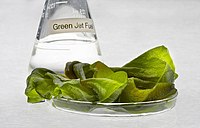
Photo from wikipedia
Abstract Microalgae are valuable sources of proteins due to their ability to accumulate high levels of nitrogen in their cells’ interior. Similar to plant-derived proteins though, many microalgae proteins are… Click to show full abstract
Abstract Microalgae are valuable sources of proteins due to their ability to accumulate high levels of nitrogen in their cells’ interior. Similar to plant-derived proteins though, many microalgae proteins are not structural but storage proteins and consequently have low aqueous solubility limiting their use in food, pharmaceutical or personal care applications. Since a number of studies had previously shown that solubility limitations of proteins may be overcome by fragmentation into smaller, soluble polypeptides, it was postulated that acid-induced hydrolysis may lead to extracts with improved functional properties. To test this hypothesis, proteins extracted from Chlorella protothecoides were treated with hydrochloric acid (HCl) at varying acid concentrations (0, 0.05, 0.5, 2 and 6 M) for 0, 1, 2, 4 and 6 h, and hydrolysates were then characterized by a variety of techniques including optical microscopy, gel electrophoresis, ζ-potential, and surface hydrophobicity measurements. Results revealed an unusual resistance of insoluble microalgae protein-rich fractions to acid hydrolysis. Solubility remained low at about 22–25 % after 6 h of hydrolysis with 0.05 M HCl, and only increased to 57% after extensive treatments with 6 M HCl for 6 h, and even then, some larger protein particles were still present in the hydrolysates. Correspondingly, results of measurements of ζ-potentials and hydrophobicity of hydrolysates were indicative of having mixtures of both fragmented polypeptides and unhydrolyzed protein aggregates present at all times. Our results are of importance to researchers currently investigating the further use of insoluble proteins extracted from plant or microbial sources.
Journal Title: Colloids and Surfaces A: Physicochemical and Engineering Aspects
Year Published: 2019
Link to full text (if available)
Share on Social Media: Sign Up to like & get
recommendations!